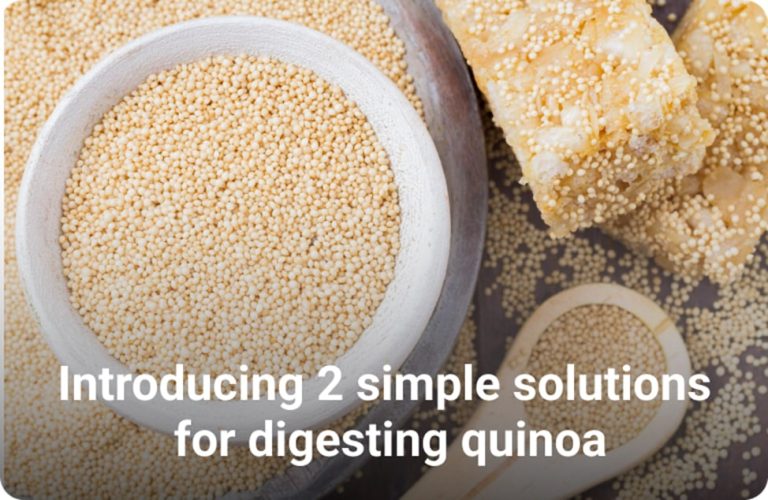Healthy nutrition and easy digestion of quinoa are very important, and in this article, we will talk about solutions for digesting quinoa. In recent decades, quinoa has become known as one of the popular food products worldwide. This small but energetic grain is rich in nutrients. Since healthy nutrition and digestion of quinoa have always been important and have a significant impact on the proper functioning of the digestive system, we have decided to talk about solutions for better and easier digestion of quinoa in this article. However, it should be noted that if quinoa is consumed correctly, it is easily digested by the digestive system and the digestion process is similar to vegetables. But consuming quinoa improperly can cause digestive problems and lead to gastrointestinal disorders. In this article, we intend to first explain the problems related to digesting quinoa for you, then provide you with solutions to facilitate its digestion.
About the benefits of quinoa
Excellent source of protein: Quinoa has a high amount of protein that is valuable for vegetarians or those looking for plant-based protein sources. The proteins present in quinoa provide essential amino acids to the body.
Dietary fiber: The fiber in quinoa helps improve digestion. This nutrient increases food consumption volume and therefore improves the digestion process.
Vitamins and minerals: Quinoa is a good source of B vitamins, vitamin E, iron, copper, magnesium, and phosphorus, which play an important role in improving digestion.
If you have recently become familiar with quinoa and do not have any information about its unique properties, we recommend referring to the article “Benefits of Quinoa”.
Problems related to digesting quinoa
As mentioned earlier, quinoa is a highly nutritious and beneficial pseudo-cereal grain that is easily digested when consumed correctly. Since quinoa contains high amounts of nutrients, excessive consumption or consuming it raw can create problems that make the digestion process difficult. We will mention these cases below:
Increased fiber intake: Since quinoa contains a high amount of fiber, excessive consumption can cause stomach problems such as gastritis or digestive disorders and constipation.
Phytic acid: Quinoa contains a considerable amount of phytic acid that can interfere with the absorption of minerals such as iron and calcium and consequently lead to digestive complications.
Solutions to facilitate quinoa digestion
Soaking Quiona: Soaking Quiona before cooking can break down phytic acid and improve mineral absorption; in this case, the process of digesting Quiona becomes easier.
Moderate consumption: It is recommended to consume Quiona in moderation so that it does not have a negative effect on the stomach and digestive system. It is better to consume 200-400 grams of Quiona daily; in this case, digesting Quiona will be easier without any problems.
Nowadays buying high-quality pure Quiona is one of the main concerns for those interested in Quiona seeds and its products; if you also intend to buy the best quality Quiona seeds, we recommend visiting “Quinoa Purchase” page.
Stages of digesting Quinoa in the digestive system
Stages of digesting Quiona in the digestive system:
1. Digestion in the mouth: The process begins with chewing when enzymes like amylase help break down starch present in Quiona into smaller particles.
2. Preventing phytic acid from affecting iron and calcium absorption: After swallowing, Quiona moves into the digestive system where minerals like iron and calcium combine with it. A high amount of phytic acid prevents iron and calcium absorption. To enhance their absorption by reducing phytic acid effects on them it’s better soaking them before cooking.
3. Protein breakdown: In the stomach, pepsin enzyme starts break
Generally, improper use and excessive consumption of quinoa can potentially cause digestive problems. To facilitate easier digestion of quinoa, you can use tricks such as soaking it before cooking and combining it with other foods. Additionally, paying attention to balanced and appropriate consumption of quinoa plays an important role in improving digestion and absorption of nutrients from this grain. If you are unsure about the daily amount of quinoa that is beneficial for your body, you can consult a nutrition specialist. Since quinoa has numerous properties and can provide the body with various vitamins and proteins it needs, you can add quinoa to your diet and take advantage of its benefits for improving digestion and the health of your digestive system. For more information about quinoa and its different products, visit “Kinofit“. In this article, we first explained the problems related to digesting quinoa for you, then provided solutions to facilitate its digestion; we thank you for staying with us until the end.
Frequently Asked Questions
Can quinoa be consumed raw?
Yes, you can consume raw quinoa after washing it, but cooking it is more precise and effective.
Is quinoa suitable for diabetics?
Yes, with the fiber present in it, quinoa can help control blood sugar levels, but it is better to consult with your doctor.
How can I consume an appropriate amount of quinoa per day?
You can consume quinoa as one of your meals during the day, such as breakfast or lunch.
Can children eat quinoa too?
Yes, quinoa is also suitable for children, but it is better to start with a smaller amount and increase consumption as they grow and adapt.
Does quinoa contain gluten?
No, quinoa does not contain gluten and is suitable for people with gluten sensitivity or those who do not consume gluten.



